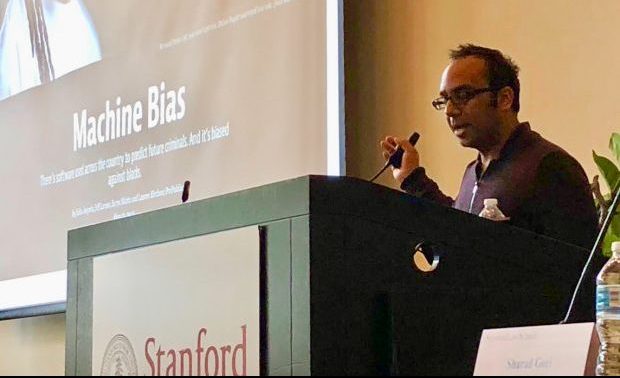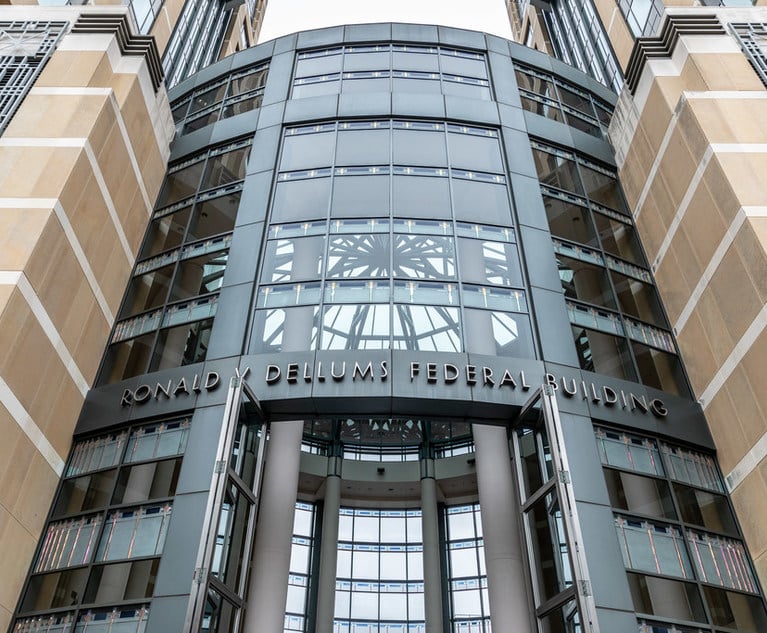We Can't All Be 'Big Law' Partners and Other Takeaways From Stanford's #FutureLaw Conference
The importance of technology and specialization in the future of the legal profession, as well as the benefits and pitfalls of AI, were major themes at this year's event.
April 05, 2018 at 10:12 PM
4 minute read

PALO ALTO—An underserved legal market. Inefficiency at law firms. Bias and amorality in artificial intelligence. These are some of the themes that were percolating Thursday at the Stanford CodeX center's FutureLaw conference, an annual event focusing on tech innovation in the legal industry.
The tenor of the event was one of both excitement and urgency, with the occasional dour warning that technology may actually end up putting some lawyers out of work. It was hard to escape the feeling that technological change is coming to the legal profession—and fast.
Here are some highlights from the daylong event:
1. “We can't all work at Big Law charging $800 an hour.”
That was the assessment of American Bar Association president Hilarie Bass, who is also co-president of Greenberg Traurig. She delivered the keynote address at FutureLaw. “The market for those legal services will remain,” she added, “but it's going to get more narrow than ever.”
Bass described a legal industry, education system and regulatory structure that is fundamentally mismatched with the market needs in the United States. Roughly 80 percent of Americans don't have access to legal services, she said, and that's in large part due to the fact that they're so expensive.
State bars require general legal education, even though the clients are demanding increasing specialization, Bass noted. “We don't ask our neurosurgeons to take a test on pediatrics. But that's how we test our lawyers.” And she observed that few laws schools are teaching students how to use AI or do legal project management, even though those are increasingly valued skills in the field.
Bass also warned that client-side pressure for fixed cost arrangements will force firms to adopt technology and become more efficient—or else lose to competitors who do.
2. AI has an “underspecification” problem.
“We have to remember that algorithms are good at what they're good at and incredibly bad at everything else,” said Sharad Goel, an assistant professor and executive director of the Stanford Computational Policy Lab. In a panel on fairness, accountability and transparency (FAT) in artificial intelligence, Goel highlighted how skewed datasets can lead to biased AI output, and the limitations of software in solving underlying policy problems.
Meanwhile, CodeX fellow Bryan Casey discussed the horrifying consequences that could ensue if self-driving cars are one day programmed only to reduce the liability of the manufacturer—a coldly logical end goal if machines are wired to internalize tort law and profit maximization. Casey warned that would lead to robot cars that accord less value to the lives of pedestrians in poorer areas and more to those in an “upper-crust” Silicon Valley neighborhood, for example, even though human drivers (hopefully) wouldn't act the same. (He also wrote a paper on this.)
It's a problem known as “underspecification,” or machines not being told what the real end goal is or how to get there, explained Google Brain fellow Been Kim. She also talked about how to shed more light on how AI models reach their conclusions, using a method called “testing with concept activation vectors (TCAV).” Short version: It's peeling back the layers of how a machine reached its decision, to be able to assess its biases and the validity of its results. That could become even more important with the new European Union data privacy law which establishes a “right to explanation” for AI.
3. Legal tech is proliferating.
Pieter Gunst, CodeX fellow and co-founder of Legal.io, gave an overview of how the legal tech industry has grown using metrics gathered through a project called the CodeX TechIndex. Among its findings was that document automation is the most crowded corner of the industry, with nearly 200 companies in that space, followed by legal marketplaces, practice management and analytics at a distant fourth.
While many in the industry have said that legal technology and AI will free up lawyers to do only the interesting part of their jobs, Larry Bridgesmith, the founder of a company called LegalAlignment, was more somber. “I'd love to say AI's not going to put any lawyers out of work. That'd be a lie,” he said. “If 60 to 90 percent of your day can be automated, what are you going to do when it is?”
This content has been archived. It is available through our partners, LexisNexis® and Bloomberg Law.
To view this content, please continue to their sites.
Not a Lexis Subscriber?
Subscribe Now
Not a Bloomberg Law Subscriber?
Subscribe Now
NOT FOR REPRINT
© 2025 ALM Global, LLC, All Rights Reserved. Request academic re-use from www.copyright.com. All other uses, submit a request to [email protected]. For more information visit Asset & Logo Licensing.
You Might Like
View All
Crypto Exchange’s ‘Meteoric Rise’ Leads to Nationwide Class Action Trend
4 minute read
Penn State Dickinson Law Dean Named President-Elect of Association of American Law Schools
Trending Stories
Who Got The Work
J. Brugh Lower of Gibbons has entered an appearance for industrial equipment supplier Devco Corporation in a pending trademark infringement lawsuit. The suit, accusing the defendant of selling knock-off Graco products, was filed Dec. 18 in New Jersey District Court by Rivkin Radler on behalf of Graco Inc. and Graco Minnesota. The case, assigned to U.S. District Judge Zahid N. Quraishi, is 3:24-cv-11294, Graco Inc. et al v. Devco Corporation.
Who Got The Work
Rebecca Maller-Stein and Kent A. Yalowitz of Arnold & Porter Kaye Scholer have entered their appearances for Hanaco Venture Capital and its executives, Lior Prosor and David Frankel, in a pending securities lawsuit. The action, filed on Dec. 24 in New York Southern District Court by Zell, Aron & Co. on behalf of Goldeneye Advisors, accuses the defendants of negligently and fraudulently managing the plaintiff's $1 million investment. The case, assigned to U.S. District Judge Vernon S. Broderick, is 1:24-cv-09918, Goldeneye Advisors, LLC v. Hanaco Venture Capital, Ltd. et al.
Who Got The Work
Attorneys from A&O Shearman has stepped in as defense counsel for Toronto-Dominion Bank and other defendants in a pending securities class action. The suit, filed Dec. 11 in New York Southern District Court by Bleichmar Fonti & Auld, accuses the defendants of concealing the bank's 'pervasive' deficiencies in regards to its compliance with the Bank Secrecy Act and the quality of its anti-money laundering controls. The case, assigned to U.S. District Judge Arun Subramanian, is 1:24-cv-09445, Gonzalez v. The Toronto-Dominion Bank et al.
Who Got The Work
Crown Castle International, a Pennsylvania company providing shared communications infrastructure, has turned to Luke D. Wolf of Gordon Rees Scully Mansukhani to fend off a pending breach-of-contract lawsuit. The court action, filed Nov. 25 in Michigan Eastern District Court by Hooper Hathaway PC on behalf of The Town Residences LLC, accuses Crown Castle of failing to transfer approximately $30,000 in utility payments from T-Mobile in breach of a roof-top lease and assignment agreement. The case, assigned to U.S. District Judge Susan K. Declercq, is 2:24-cv-13131, The Town Residences LLC v. T-Mobile US, Inc. et al.
Who Got The Work
Wilfred P. Coronato and Daniel M. Schwartz of McCarter & English have stepped in as defense counsel to Electrolux Home Products Inc. in a pending product liability lawsuit. The court action, filed Nov. 26 in New York Eastern District Court by Poulos Lopiccolo PC and Nagel Rice LLP on behalf of David Stern, alleges that the defendant's refrigerators’ drawers and shelving repeatedly break and fall apart within months after purchase. The case, assigned to U.S. District Judge Joan M. Azrack, is 2:24-cv-08204, Stern v. Electrolux Home Products, Inc.
Featured Firms
Law Offices of Gary Martin Hays & Associates, P.C.
(470) 294-1674
Law Offices of Mark E. Salomone
(857) 444-6468
Smith & Hassler
(713) 739-1250








